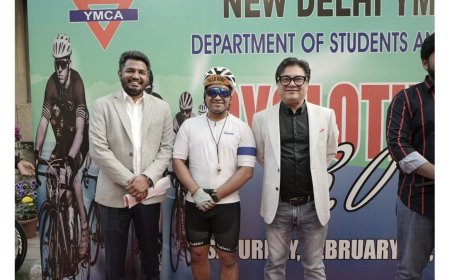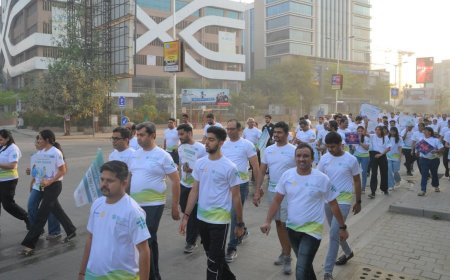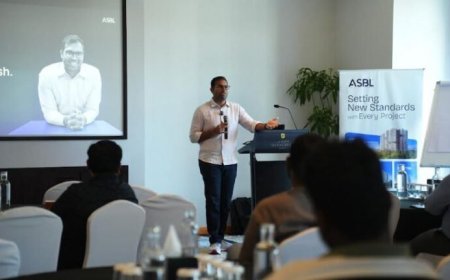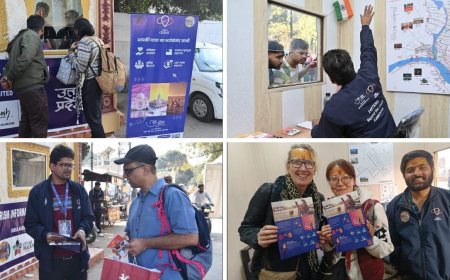Born to Fight: The Lifelong Struggle of Women for Safety in India
New Delhi [India], April 10: India has always celebrated the feminine force—be it Durga, Lakshmi, or Saraswati—but when it comes to real women, the safety, dignity, and rights promised to them remain compromised. From the moment a girl is conceived to her final breath, every stage of her life demands survival skills, not just life [...]
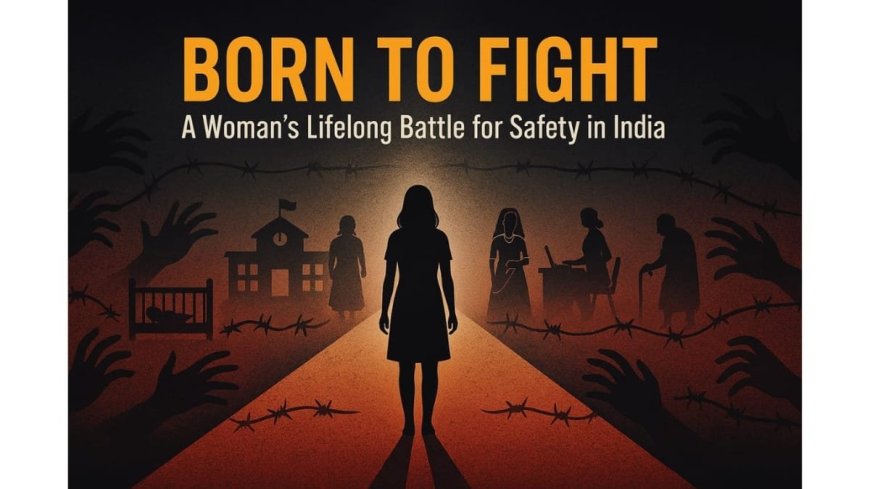

New Delhi [India], April 10: India has always celebrated the feminine force—be it Durga, Lakshmi, or Saraswati—but when it comes to real women, the safety, dignity, and rights promised to them remain compromised. From the moment a girl is conceived to her final breath, every stage of her life demands survival skills, not just life skills. It is not empowerment she enjoys, but a series of invisible battles she must fight daily. In a country that reveres female deities, why do our laws and systems fail to treat women with the same sanctity? Why is sexual, mental, and physical harassment still so rampant? Let us dig deep dive into the life-long struggle of Indian women, real-life horrors they face, legal gaps, and what must be done to give them the freedom they deserve.
Womb Wars: The Girl Child’s First Battle
Even before birth, many Indian girls fight for the right to exist. The sex of a fetus, when female, often brings silence, shame, or even a secret abortion – despite the PCPNDT Act (1994). The numbers expose this silent war: only 929 girls are born for every 1000 boys (NFHS-5). She is erased before her story begins – seen not as a child, but a future dowry burden. This must change. Real-time surveillance of ultrasound clinics is vital. Families raising daughters must be supported and celebrated. And every birth must trigger a gender audit – because no girl should vanish uncounted, unloved, or unprotected.
Childhood: The End of Innocence
For many Indian girls, childhood isn’t innocent – it’s terrifying. Over 53% of children report sexual abuse, with girls being the majority. Worse, the predators are often trusted: relatives, neighbours, family friends. The silence around this must break. Schools must introduce compulsory sex education to help children recognize abuse early. POCSO fast-track courts must become survivor-friendly, not system-driven. And parents must report abuse without shame – because protecting a child’s dignity should always come before protecting family image.
“A woman should not have to be brave every day.
She deserves to be safe every day.”
– Adv Bindu Dubey
Teenage Years: Harassment Becomes a Daily Routine
As girls hit adolescence, their world shifts – not with freedom, but with fear. Stares, catcalls, groping in buses, even harassment at school and tuition become routine. Her body is no longer hers – it’s judged, shamed, and targeted. And now, abuse hides behind screens too – morphed photos, leaked chats, blackmail. Society still tells her to cover up and stay silent – while boys face no checks. This must end. We need anti-stalking apps linked to police stations, female attendants on school buses, and trained counsellors in every school. Because every teenage girl deserves safety – not survival tactics.
Her Maternal Home: Shelter or Silent Judge?
The home where a girl learns to walk, dream, and laugh is often the first place where she’s told to shrink. From childhood, she’s trained to obey, adjust, and suppress — reminded constantly, “You’ll leave for your husband’s house one day.” Her freedom is monitored, her ambitions clipped. She becomes a guest in her own home — her identity seen as temporary; her voice conditional. Marriage pressure begins early — to prevent her from “falling in love” or “shaming” the family. Even in pain or abuse, she’s asked to compromise. Her maternal home, instead of being a refuge, turns into a silent judge. This must change. Equal parenting rights for daughters must become a norm, not a favour. Child and forced marriages must be met with strict legal deterrents. And most importantly, legal awareness must reach every corner of India – so every girl knows she has rights, power, and a place she belongs.
Her Matrimonial Home: From Dreams to Demands
Marriage in India is often sold as a dream – but for many women, it’s where the nightmare begins. What should be a sanctuary often becomes the epicenter of abuse. Dowry, though illegal, still thrives under the guise of “gifts”. When demands aren’t met, abuse follows – insults, beatings, starvation, and even death. NCRB 2023 reports over 6,800 dowry deaths – nearly 19 women killed every day. Many are told to “adjust” while their lives fall apart. This must end. Section 498A IPC needs fast-track hearings. Wedding gift disclosures must be mandatory. And in-laws must face legal action – because silence is complicity. Dowry isn’t tradition – it’s murder in slow motion.
Workplace: Where Equality Meets Exploitation
She studied hard, shattered stereotypes, and earned her place in boardrooms. But along with success came judgmental stares, unsolicited remarks, and veiled advances dressed as professionalism. Despite the POSH Act, 2013, workplaces remain unsafe – especially in startups and small firms. Only 40% of Indian companies are POSH-compliant, and many just on paper. This must change. Mandatory gender audits, real-time implementation, and regular POSH training should be non-negotiable. Because equality doesn’t end with opportunity – it begins with safety.
Elderly Women: The Forgotten Victims
She raised families, gave up dreams, and carried generations – yet in her twilight years, she’s often abandoned, manipulated, and made to feel invisible. In India, elderly women – especially widows or those without children – face silent abuse masked as neglect. Their property is taken, their voice dismissed, and their pain normalized. It’s time for reform. Mandate property registration in widows’ names, offer free legal aid for senior women, and make elder abuse a cognizable, non-bailable offense. Because dignity should grow with age – not disappear with it.
Public Spaces: Her Path Isn’t Free, It’s Mapped by Fear
For many women, stepping out of the house isn’t just a routine – it’s a calculated risk. Whether it’s a crowded bus, a dimly lit railway platform, or just a walk down a busy street, danger follows her like a shadow. A hand brushing where it shouldn’t, a lewd comment whispered just loud enough, a stranger too close for comfort – these aren’t rare incidents. They’re daily battles. Public spaces, meant for everyone, feel hostile to her. The fear of being touched, stared at, followed, or attacked pushes women into invisible cages – shrinking their world, limiting their choices. CCTV cameras, pink booths, and women-only compartments may offer temporary relief, but they don’t fix the root cause – male entitlement and social apathy. True change needs more than token solutions. We must start by boosting police patrolling, especially in known harassment zones. And let’s empower good citizens too – incentivize those who report harassment in real-time, making public safety a shared responsibility. Because a nation where a woman doesn’t feel safe on her way to school, work, or back home – is not a free nation at all.
Enough is Enough: Call for Zero Tolerance
From the womb to the workplace, from home to highway, from childhood to her final days – a woman in India is constantly told to “adjust,” “be careful,” or “keep quiet.” The cost of being a woman is eternal vigilance. The freedom to exist safely is still a luxury – not a right. We celebrate women as goddesses, but do not give them the legal armor to live without fear. Why does India, a nation that worships Durga and Kali, still allow her daughters to be beaten, raped, silenced, and shamed? India does have robust laws—Section 498A, Domestic Violence Act, POCSO, POSH—but poor implementation, slow justice, low conviction rates, and corruption make them toothless. As per NCRB 2023, rape conviction rate stood at 28% while domestic violence cases often drag for years.
Recommendations
- Enforce a “Zero Tolerance” Policy: Introduce capital punishment for proven brutal rapes and dowry deaths. Fast-track courts with verdicts within 90 days for crimes against women.
- Boost Enforcement of POSH and POCSO: Conduct third-party audits of compliance and set penalties.
- Women’s Safety Index: Launch a national index ranking states based on real-time safety and justice metrics.
- Legal Education from School Level: Make legal literacy and consent education part of the high school curriculum.
From Safety to Sovereignty
Women in India don’t just want to survive – they want to live. Freely. Safely. With dignity. But today, from a girl child in a village to a CEO in a metro, every woman is forced to constantly safeguard herself. This must end.
India must match its cultural reverence of women with constitutional respect. We need laws with teeth, systems with speed, and a society with soul. Until then, our daughters, sisters, and mothers will continue to live as warriors in a war they never chose.
Author Profile:
Adv. Bindu Dubey is a leading lawyer, for Women Rights in India, and founder of Adv. Bindu Dubey & Associates and NRI Lawyer in India, Mumbai-based law firms known for their strong focus on gender justice, family law, and criminal litigation. With over a decade of legal experience, she has fought for survivors of domestic violence, sexual abuse, and dowry harassment, becoming a powerful voice for justice.
She also serves as a trustee of the Bindura Foundation, driving outreach and legal awareness across India. A vocal advocate for stronger enforcement of laws like POCSO and the Domestic Violence Act, she regularly features in national media and radio to educate people about their legal rights.
If you have any objection to this press release content, kindly contact pr.error.rectification@gmail.com to notify us. We will respond and rectify the situation in the next 24 hours.
What's Your Reaction?















